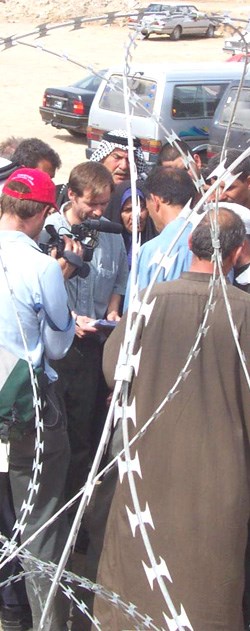You know it's a quiet day when journalists start calling other journalists to fish for story leads.
Sault Ste. Marie has enough national reporters in town today to cover a First Ministers' Conference.
They're all here to follow the James Loney story, but after interviews with the Loney family and local clergy, some of them are finding themselves short of ideas on where the story should go next.
There's absolutely nothing coming out of Iraq on either the wellbeing of Loney and his three fellow captives, or on negotiations, which appear to be non-existent.
Some of the visiting journos have been trying to track down Sault Ste. Marie relatives of the British hostage Norman Kember, but so far they've only made contact with a distant cousin who's never met the retired professor of physics from Pinner, Middlesex, England. Some are following the trail to Sarnia, Ontario, where a group of Kembers from England are said to have attended a family reunion this year.
In London, England, the BBC is reporting that both Christians and Muslims will attend a vigil today for Kember, Loney and the two other hostages outside St. Martin in the Fields Church, London.
The kidnapped four were all members of Christian Peacemaker Teams, a ministry that, among other things, was involved in documenting abuses at prisons in Iraq.
The big story out of Iraq today is a new report of severe torture at a jail housing Iraqi detainees.
There've been at least dozen cases uncovered that include fingernail removal, electric shock, broken bones and burning with cigarettes, the report indicates.
The following is an e-mail about torture sent by Loney to supporters and friends, prior to his November 26 kidnapping.
The image accompanying this article shows Loney documenting stories of detainees at Abu Ghraib prison in Iraq.
***************** Bahr Kadhin Al Saady has had a difficult life.
You can see it in the creases of his face, the set of his jaw, the spartan lines of his body.
Like all able-bodied, working-class men, Bahr was conscripted into the Iraqi army by Saddam Hussein at the age of 18.
In 1994, at the age of 19, Bahr refused a direct order to join an army patrol "to fight the people of Kurdistan."
"When they asked me why, I told them those people are Iraqi people, and they are Muslims. If I kill them, God will be angry with me. I do not want to kill anyone. Because of this, I was accused of being a traitor and sent to jail," he says.
Bahr pointed to a three-inch scar above his right temple.
"This is where they beat me with the butt of a pistol."
He stood and pulled up his shirt to show me dozens of long white scars criss-crossing his back.
"They gave me lashes with a cable until they cut the meat."
Bahr held out his hands.
His finger tips were swollen, bulbous, his fingernails unnaturally curved.
"They poured water on me and then put electrodes on my fingers. They hoisted me into the air on a hook for two hours with my hands tied behind my back. They called it 'the scorpion.'"
After three months of this treatment, Bahr was released and ordered once again to join the patrol.
Rather than obey, Bahr deserted. "I had no choice. God would be angry at me if I went."
He was captured in early October.
After a series of lashings, they told him they were going to cut off his ear.
On October 10, 1994 - the day of my 30th birthday they took Bahr to a hospital, handcuffed and blindfolded.
"They gave me an injection in my hand and I lost consciousness. When I woke up, I was in pain. I said to myself this isn't real - it's a nightmare - but when I felt my bandaged ear, I knew it wasn't a dream."
Bahr spent the next two years in prison. "I found many friends," he said.
"There were 19 soldiers who were exposed to the same treatment. Some of them had little bits of their ear cut, some had big pieces cut."
A total of 3,600 war resisters and deserters were thus socially branded by the Saddam regime.
Bahr was released in 1996.
Resolution 115 effectively stripped the war resisters of their citizenship.
Bahr's ID was stamped and he was thereafter ineligible for any government job (a life sentence of unemployment under Baath socialism), banned from owning a car or a house, denied access to education and had his ration card pulled (a severe hardship in sanctions-starved Iraq).
His disfigured ear was a badge of social quarantine.
"My cut ear became something shameful for me. It affected all my social relationships."
I asked Bahr how he had come to his decision to refuse war.
He struggled to find language he didn't have.
"I don't know," he said. "It is something primitive in me. I cannot kill."
When I met Bahr in January 2004, he was living in a looted government building.
As president of the Committee of People Who Refused Wars, he spent his days organizing for the repeal of Resolution 115, seeking compensation and arranging auricular reconstructions for his fellow war resisters.
Internal conflicts have since pulled the Committee apart.
Bahr is still homeless, jobless and penniless, his suffering unknown and unacknowledged.
Sometimes he struggles with whether or not to continue living.
I thank God for you, Bahr.
You have set your face like flint against the war machine.
By your wounds you are healing the world; the punishment you accept brings us peace.
You are the suffering servant, all that is holding the world together.
********************
